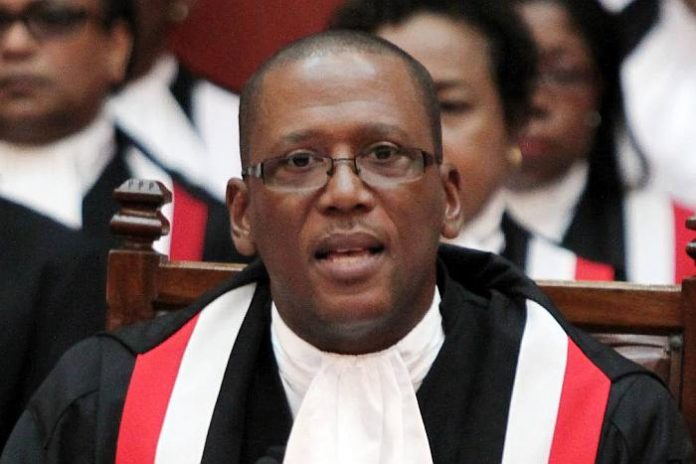(Trinidad Guardian) The introduction of jury-less trials will not, on its own, make a dent on chronic backlogs within the criminal justice system.
This was the consensus reached by several legal and judicial luminaries following a panel discussion on the issue hosted by the Judiciary’s Judicial Education Institute of T&T at the Hall of Justice in Port-of-Spain, on Tuesday.
Chief Justice Ivor Archie, a long-time proponent of the initiative, was the first to admit that it could not be expected to make an immediate tangible impact on backlogged cases.
“The introduction of trial by judge alone is not intended by any means nor do we pretend that it is a cure. It is within a range of tools available,” Archie said, as he noted that urgent and innovative action was needed as there are over 700 people spending between five and 10 years on remand awaiting trial for capital offences.
He claimed that much of the public furore of the initiative was based on misconceptions of the Miscellaneous Provisions (Trial by Judge Alone) Act, which was passed by Parliament in 2017 but is yet to be proclaimed.

Archie was careful to note that the legislation gives the option to an accused person, who receives legal advice, to choose a jury-less trial. The accused person also has the power to reverse their decision within a reasonable time before the trial is set to begin.
Archie suggested that the system was more transparent as judges would be required to give written decisions in cases unlike in traditional trials where juries simply decide guilt and innocence.
“We simply just don’t know what happens in the jury room,” he said, as he noted at approximately 90 per cent of criminal cases were currently done by magistrates based on similar elections by accused people.
Archie’s warning on the unrealistic impact of the legislation was supported by Director of Public Prosecution (DPP) Roger Gaspard, SC, who suggested that other improvements are more urgently needed.
“All I am saying is, perhaps before we focus all or too much of our energies on the whole notion of the abolition of trial by juries, there are many bugbears which impact the criminal justice system as we know it,” Gaspard said.
He suggested that better case management, increased reliance on scientific evidence such as DNA, witness protection and measures to allow witnesses to testify anonymously should be considered first.
“Sometimes the shortage of resources can prove to be so critical that it may prove to be very difficult to get a move on. If you have 700-odd murder cases pending, resources are an important issue,” he said.
While Gaspard said that he and his office supported the legislation, in principle, he said that he felt that jury trials are an important facet of democracy.
“The jury system represents an avenue and possibility of the common man on the bus, in the Croisse or in San Fernando to contribute to the judicial system. So when the common man is liming on the block he would not tell you about a story that involves we and them but rather a story that involves us,” Gaspard said.
Not surprisingly, criminal defence attorneys were opposed to the move.
While most seasoned attorneys were not present for the event, their views were expressed through Law Association President Douglas Mendes, SC, who sat on the panel.
Although he admitted that he was personally in support, Mendes claimed that those members who he spoke to had claimed that jury trials were fairer and gave their clients the best prospect of success at trial.
He said that they were mainly willing to consider jury-less trials in complex fraud and sexual offences cases where “the jury may be sympathetic to the victim and not their client.”
As part of the event, retired Northern Irish Judge Sir Anthony Hart and Cayman Island Judge Marlene Carter spoke about the use of the trials in their jurisdictions.
Hart admitted that they were introduced in the 1970s to deal with terrorist cases and since then have been used in conjunction with traditional trials.
Hart claimed that he was impressed by the legislation as it provided for the accused person and not the DPP’s office to elect for such a trial.
As he attempted to illustrate the fairness of such trials, he pointed to statistics from his country which revealed that a reasonable amount of people receive acquittals from judges.
Carter said that this country’s legislation was similar to her jurisdiction as accused people are allowed to elect for jury-less trials.
She said that despite concerns raised over the unwillingness of accused people to exercise the option, 30 to 35 per cent of cases in her country were done without juries.
Carter said she was impressed with local legislation as it provided safeguards in which judges are given a 14-day time limit for providing their decisions and reasons.




